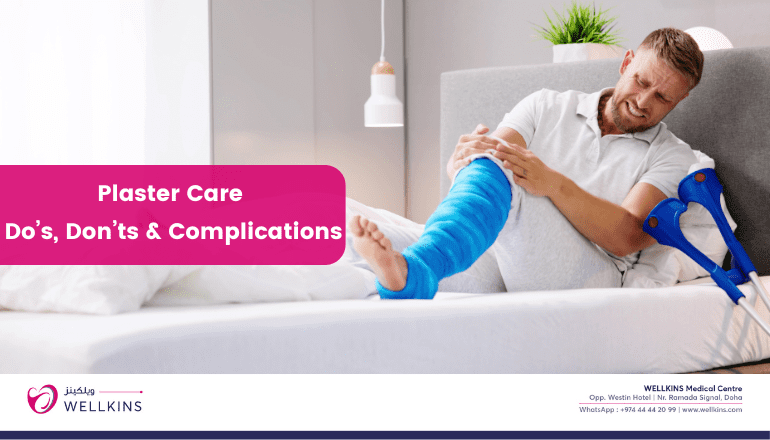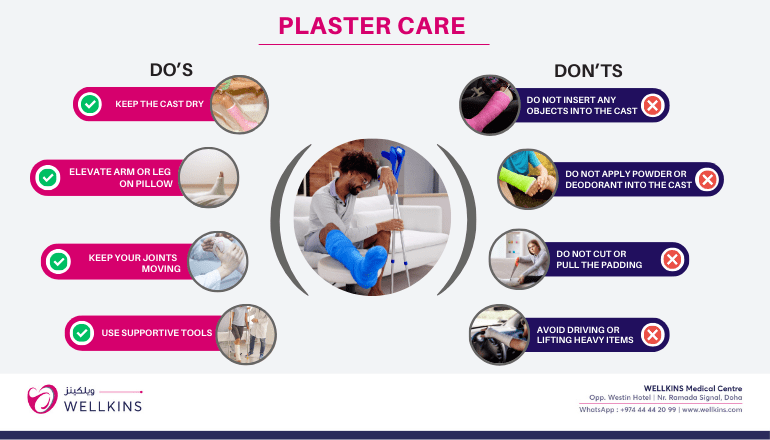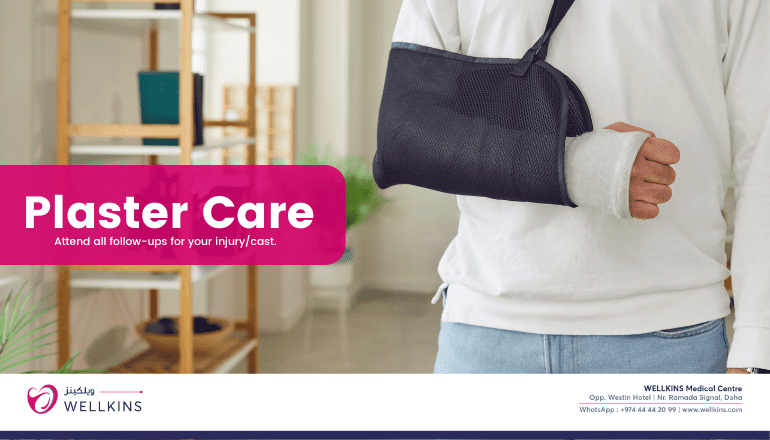Author: Dr.Reneesh (Consultant Orthopedic Surgeon – WELLKINS Medical Centre)
When a fracture or injury requires immobilization, plaster casts (or fiberglass casts) are essential for proper healing. However, proper care of the cast is crucial to avoid complications and ensure a smooth recovery process. This blog will guide you on the do’s and don’ts of plaster care, potential complications, and signs that indicate you need medical attention.
By taking care of your plaster cast, you can reduce the risk of complications and promote faster healing.
Proper plaster care is essential for preventing pain and ensuring optimal healing.
Do’s of Plaster Care
Keep the cast dry: Always use a waterproof cover when showering or bathing to avoid moisture from seeping into the cast.
Elevate the limb: In the first few days after the cast is applied, elevating the limb can help reduce swelling and pain. Keep it raised above heart level.
Exercise the joints around the cast: Move the fingers or toes that are not covered by the cast to promote circulation and prevent stiffness.
Inspect the skin around the cast: Check for redness, swelling, or irritation regularly. Use a mirror to see areas that are hard to reach.
Keep the cast clean: Avoid dirt or foreign objects from entering the cast to prevent skin infections.
Don’ts of Plaster Care
Don’t wet the cast: Avoid getting the cast wet, as moisture weakens plaster casts and can lead to skin infections. If it accidentally gets wet, consult your doctor.
Don’t insert objects into the cast: Resist the urge to insert objects like pencils or rulers to scratch an itch. This can lead to wounds and infections.
Don’t cut or modify the cast: Never attempt to remove or adjust the cast on your own. If it’s too tight or uncomfortable, contact your healthcare provider.
Avoid weight-bearing activities too soon: Follow your doctor’s advice on when it’s safe to put weight on the injured limb. Premature pressure can disrupt healing.
Potential Complications to Watch For After Wearing a Plaster Cast
Swelling and pressure sores: If the cast is too tight or the limb swells, it can cause pressure sores, numbness, or tingling.
Skin irritation: Moisture trapped inside the cast can lead to rashes or skin infections, particularly in children.
Compartment syndrome: A serious condition that occurs when swelling increases pressure within the muscles, potentially cutting off blood supply. Immediate medical attention is needed.
Joint stiffness: Extended immobilization can cause joint stiffness, which may require physical therapy once the cast is removed.
Cast cracking or breaking: If the plaster cracks or breaks, it can no longer provide proper immobilization.
Seek immediate medical attention if you experience any of the following after wearing a plaster cast:
Increased pain: If pain worsens or is no longer relieved by medication or elevation, it could indicate a complication.
Numbness or tingling: Numbness, tingling, or a pins-and-needles sensation in the fingers or toes could be signs of nerve compression or poor circulation.
Discoloration of the skin: Bluish or pale skin below the cast indicates restricted blood flow.
Foul smell or discharge from the cast: This could signify an infection, especially if accompanied by fever.
Excessive swelling: Continuous or excessive swelling beyond the first few days needs to be evaluated.
Loose cast: If the cast becomes loose or no longer fits properly, it won’t support the injured area as required.
Follow up/contact
It is important to attend all follow up appointments relating to your injury/cast.
On average, a cast stays on for about six weeks. This may be longer or shorter, depending on your age, general health and the type of fracture.
If the cast becomes cracked, loose or soft, or if you have any concerns, please see your local doctor, your local emergency department or phone the Orthopaedic doctor
Conclusion
Proper plaster care is essential to avoid complications and ensure effective healing. By following these guidelines and staying alert to warning signs, you can prevent further injury and promote a speedy recovery. If you ever have concerns about your cast or symptoms, always seek medical advice promptly.








